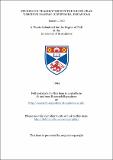Studies on phagocytosis in the shore crab 'Carcinus maenas' (Crustacea, Decapoda)
Abstract
Phagocytosis by hyaline cells of the shore crab, Carcinus maenas, was investigated in vitro. In particular, the project examined the role of the prophenoloxidase activating system (proPO) in opsonisation, the metabolic requirements of the cells during phagocytosis and the extent of intracellular bacterial killing. Related work investigated the mechanism and regulation of bacterial killing. Uptake was assessed using monolayers of separated hyaline cells challenged with the bacterium, Psychrobacter iminobilis. The bacteria were pretreated with haemocyte lysate supernatant (HLS) to enhance uptake. The opsonic factor(s) were found to be freeze stable and to be generated during serine protease activation of the proPO system. Phagocytosis was also found to depend upon electron transfer and oxidative phosphorylation and to require an intact cytoskeleton for engulfment. Following ingestion, ca 84% of the bacteria were found to be killed within 3h. Experiments designed to investigate the mechanism of killing showed that treatment of the hyaline cells with phorbol 12-myristate 13-acetate, lipopolysaccharide, phytohaemagglutinin or concanavalin A, but not laminarin, sdmulates the production of superoxide ions (O2-). The semi-granular and granular cells did not produce O2- following stimulation. Incubation of the cells with superoxide dismutase (SOD) confirmed that O2- was produced. Parallel experiments were conducted on a range of marine invertebrates. In all cases O2- production was observed, showing that O2- production is a general phenomenon for invertebrate phagocytes. However, quantification of hydrogen peroxide (H2O2) production, using a H2O2 assay, showed that crab phagocytes produced more H2O2 than tunicate phagocytes indicating that the kinetics of the response varies between species. Using immunocytochemistry, the antioxidant enzymes, catalase, glutathione peroxidase and SOD were found to be located within the haemocytes and plasma of C. maenas. These enzymes may minimise the risk of damage to the host tissues by the O2- and H2O2 produced by the hyaline cells.
Type
Thesis, PhD Doctor of Philosophy
Collections
Items in the St Andrews Research Repository are protected by copyright, with all rights reserved, unless otherwise indicated.

